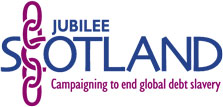 |
||
DISAPPOINTMENT IN WASHINGTON
Following last week's exciting announcement that the
UK plans to cancel our share of multilateral debt there was disappointment
at the IMF/World Bank Autumn meeting in Washington at the weekend. British
plans to win international support for writing off the debt of the world's
poorest countries came to nothing after the Group of Seven rich nations
failed to reach agreement.
Gordon Brown failed to persuade his fellow
finance ministers, meeting in Washington, to follow Britain's pledge to
provide £100 million a year to help pay off 10 per cent of Third
World debt to the World Bank and the African Development Bank.
France and Germany resisted the idea, which had received the backing of
the US, and in the end the G7 nations agreed only to 'the sustainability
of debt of the poorest countries by making progress on debt relief and
grant financing'.
Charities and aid agencies voiced bitter disappointment at the news, which
comes ahead of this week's visit to Africa by Tony Blair.
'G7 finance ministers have failed to join together to match the
action on debt taken by the UK,' said Oxfam policy adviser Max
Lawson. 'Once again rich countries have turned up with notebooks,
not chequebooks, and the price will be paid by the world's poorest people.'
Action Aid policy adviser Patrick Watt said each day of delay
by the G7 left poor countries paying out $100 million that could be spent
on health and education.
Brown had been optimistic about his proposal to use International Monetary
Fund gold reserves to write off multilateral debt. He had planned to revalue
on paper the IMF gold to pay for debt relief. However, he is said to confident
that he can eventually win over the G7 and is encouraging aid agencies
to keep up the pressure on the 'dissident' governments.
The move provided fresh impetus to press the G7, along with the IMF and World Bank, to find a way to wipe out the debt that is crushing many poor nations.
BROWN'S PLAN WAS JUST ONE IDEA AMONGST
MANY
One plan to tax international capital flows, advocated
by presidents Jacques Chirac of France and Luiz Inacio Lula da Silva of
Brazil, has been rejected by some G7 nations, notably the United States.
Germany, meanwhile, has resisted efforts for a writeoff of debt.
The U.S. and Canada want 90 to 95 percent forgiveness of Iraq's estimated $120 billion in debt to help kick-start foreign investment crucial to stabilizing the country.
France and Germany have indicated they see a 50 percent reduction as more appropriate.
European officials may be willing to accept a staged approach, starting
at 50 percent with a review clause. They would also prefer the process
be conducted through the Paris Club. US Treasury Secretary John Snow said
on Thursday he hoped to make progress on the issue, but it was not on
the formal G7 agenda and was a matter for the Paris Club.
| News |
| Past Events |
| Call for Change |
| Comment & Analysis |
| Debt Links |
| © 2004 Jubilee Scotland | |